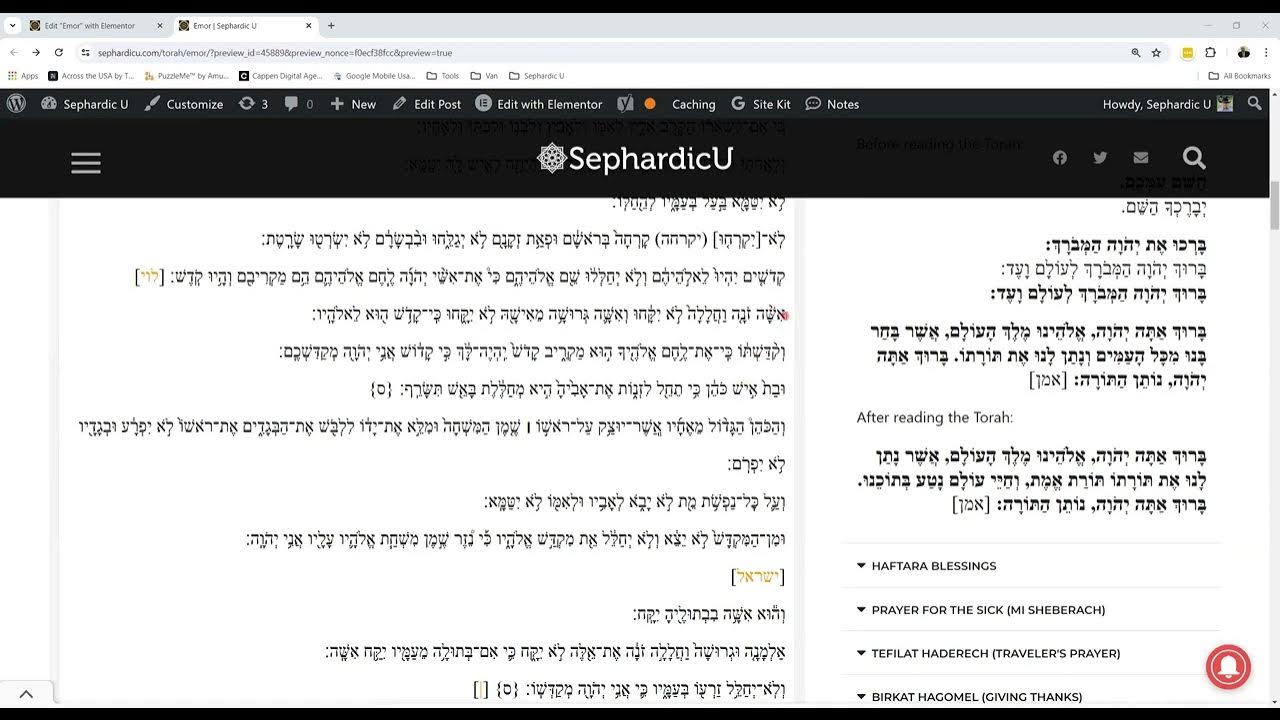Please Listen Carefully!
In the book “You Just Don’t Understand”, Deborah Tannen analyzes the different conversational styles of men and
women. Tannen analyzed hundreds of conversations between men and women, and she explains that many of these dialogs go awry because the two sides are not really having a conversation. They are not talking to each other but to their personal needs. In very general terms, when a woman speaks of a problem, she first seeks understanding and compassion, and she wants to know that her conversational partner commiserates with her and listens to her. When a man hears of a problem, he feels the obligation to offer a solution, and if he cannot do so, he feels weak and threatened.
One such dialog appears in our Parasha. When Rachel saw that Leah, her twin and adversary, is having one child after another while she is still barren, she comes to Jacob with an impossible demand: Grant me children or I will die.
Jacob is confused and becomes angry with her. He answers:
Can I replace God? He is the one who prevented you from having children.
Rachel then offers him her maidservant as a surrogate mother, and she bears two children for Jacob and Rachel.
Years later, when Rachel has children of her own, she names them after her shame and pain. Was she referring to the way she felt when she heard Jacob’s response?
The midrash (Ber. Rabbah 71:7) comments that Jacob’s response was criticized by God Himself. According to the Midrash God told Jacob that this is not a way to answer a woman in distress, and swore that Jacob will be punished for his response to Rachel.
What went wrong in the conversation between Jacob and Rachel?
Deborah Tannen’s insight can provide an answer:
Rachel comes to speak with her husband from a place of sadness, sorrow, and jealousy. Leah, the once rejected wife, now has a seat of honor as the mother of Yaakov’s growing family, while she feels estranged and alienated.
She decides to become a surrogate mother through her maid, a common practice in the Ancient Near East, and a step already taken by Sarah and Abraham, but first she wants to know that he understands her, that he has compassion for her. She conveys her emotional turmoil to him with full force, but she is not contemplating suicide. She is simply saying that without her husband’s love, outdone by Leah, and childless, she is as good as dead.
But what Jacob hears is: You are responsible for my sterility! Solve my problem!
Since he cannot solve it, he gets angry. Not at her, but at his own inability to help his beloved wife.
When he says that God prevented her from having children, she hears something completely different. Jacob wants to say that God is responsible for her situation and there is nothing he can do, but she hears the emphasis on the word “you”. She understands his words as saying that he has no problem since he has children with Leah.
Maybe Jacob should have said: “I know how you feel. I know you want children like Leah has, but I still love you more”. And perhaps she would have answered with: “No you don’t how I feel. You have your children, and as a man you will never know what it means to be barren.” He might have answered: “You are right, but I remember how my mother’s eyes would fill with tears when she spoke about the twenty-first years of her marriage, years of solitude, longing and despair.”
That would have brought a different outcome, one where Jacob does not hurt Rachel’s feelings and where he does not get punished.
These few sentences, sad and teeming with emotions, teach us a very powerful message, especially applicable to men:
Please listen carefully to your conversational partner. Try to understand where she is coming from before rushing to offer solutions. It will require additional effort, but this effort will be worth so much later, as it will save us many conflicts and clashes.
Shabbat Shalom
Questions for Kids: Parashat VaYetze
- From where does Yaakov travel and where is he going to?
- Who lives in Yaakov’s destination and how is he related to Yaakov?
- What did Yaakov see in his dream, and what does HaShem promise him?
- Yaakov says that the place where he slept is holy. What does he do to show that the place is holy?
- What was the name that Yaakov gave the place?
- Who does Yaakov meet by the water well, and how did he help her?
- What were the names of Lavan’s daughters? Who was older?
- Which one of the daughters did Yaakov love? What was he willing to do to marry her?
- Lavan cheated Yaakov into marrying someone else. Who was it?
- How many more years did Yaakov work for Rachel?
- For how long did Yaakov live with Lavan?
- How many children did he have after all these years?
- At the end of the Parasha Yaakov travels from __________ to _________ .
Answer Guide for Parashat VaYetze
- From Be’er Sheva to Charan?
- Lavan. Yaakov’s uncle.
- Yaakov saw a ladder reaching from earth to heaven. HaShem promised to protect him and bring him back to Canaan.
- He builds an altar and pours oil on it.
- Beth El.
- Rachel. He draws water for her sheep.
- Leah and Rachel. Leah was older.
- Yaakov loved Rachel and he was willing to work seven years.
- Leah.
- Seven.
- Twenty years.
- Eleven sons and one daughter.
- From Charan to Canaan.
Parasha Pointers: Chaye Sarah
- In verses 28:13-15 God promises Yaakov, in a dream, that he will receive Avraham’s blessing. Does that mean that God approves of Yaakov’s actions, or maybe that God approves only of the second blessing that Yaakov received?
- Yaakov says (28:16) “indeed YHWH can be found in this place. I did not know that.” How should this statement be understood? Did Yaakov previously believe that YHWH is a local God? Did he think that only certain places were appropriate for having a prophetic vision?
- Yaakov seems to question God’s promise (28:20-21). Does he have doubts?
- Yaakov moved by himself a stone three shepherds were not able to move (29:10). This description challenges the traditional view of Yaakov as a frail person.
- Lavan tells Yaakov that since he is not his relative, he should not work for him without pay (29:15). This is because members of the clan worked for free and were entitled to the inheritance when the patriarch died.
- Consider this possibility: Leah and Rachel were identical twins. Leah’s eyes looked different because of a disease. Yaakov could not tell them apart at night, but in the morning, when he saw Leah’s eyes, he recognized her.
- This makes Yaakov’s punishment for deceiving his father very accurate. He was deceived by a twin who claimed to be the other twin, and he could not complain to Lavan because he himself did it to Esau.
- This is why Lavan calls Leah בכירה. He wants to remind Yaakov that he took the בכורה from Esau.
- The names Leah gives her first three sons are based on feelings of abandonment and resentment. She hopes to gain her husband’s love through the children she gives him. With Yehuda, she changes the tone and just thanks God. (29:32-35).
- Yehuda, who unlike his older brothers grew up in a positive environment, eventually emerges as the leader of the Jewish People.
- Rachel is jealous of Leah and demands children from Yaakov. Her frustration as a barren woman is understandable, but the Torah labels it as jealousy. Maybe this is because Rachel did not want children for the sake of becoming a mother, but rather because she competed with her sister over Yaakov’s love.
- Yaakov feels cornered because he cannot provide a solution to Rachel’s problem, but his answer comes across as insensitive. He can be understood as saying that he has no problem because he already has children, and Rachel is the one who has a problem.
- Rachel names her two surrogate children in names that convey the struggle with her sister (30:6-8).
- Leah names her surrogate children with positive names, maybe to show that she is beyond jealousy.
- The words בא גד – luck, or blessing, arrived (30:11), are written as one word – בגד, which means “betrayed”. Does that mean that Leah thought that Yaakov should not have accepted Leah’s offer of surrogacy?
- That word also means “garment”. Could it be related to the deception of Yitzhak with garments?
- Why did Rachel steal the Teraphim, the house idols (31:19)? Note that Michal and David also had Teraphim at home (1 Sam. 19:13).
Enjoy reading and learning.
Shabbat Shalom








Parashat Behar – Weekday Torah Reading (Moroccan TeAmim)